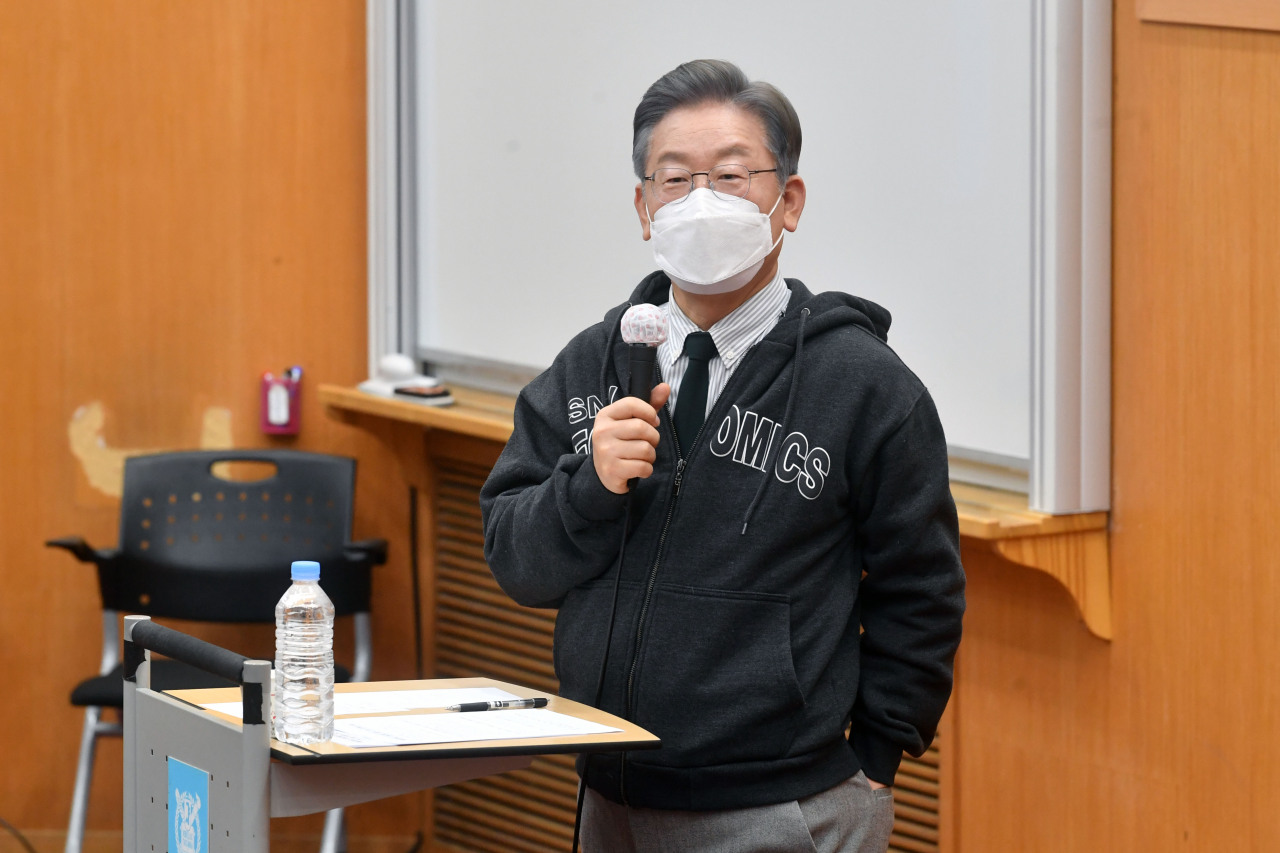DP presidential candidate defends his 'basic finance' program for youths
By YonhapPublished : Dec. 7, 2021 - 15:52

Lee Jae-myung, the presidential candidate of the ruling Democratic Party (DP), on Tuesday defended his election pledge to provide low-interest loans for youths, saying there are "good debts."
"Whether they are national debts or personal debts, it is a foolish thought to say all debts are bad," Lee said at a lecturing event at Seoul National University. "If using your future assets in advance is more valuable, I think it is right to do it."
Lee's election pledge of a basic finance program for youths is designed to help young people get loans at low interest rates. He previously pushed the scheme when he was the governor of Gyeonggi Province.
"It is not righteous for poor people to pay more interest, while rich people can borrow their wanted amount of money for a long time with low interest rates," he said. "Trust of finance comes from state power and popular sovereignty, but it is not right to omit responsibility for the poor."
Lee also stressed his promise of providing universal basic income. He earlier proposed giving 2 million won ($1,700) to the young population and the rest 1 million won a year.
"It is a policy that must exist in this new world that went through a quality change," he said. "If the objective situation changes, then economic policy has to change as well."
Asked about his decision to drop a call of providing COVID-19 relief grants to all people, Lee said he did not scrap the plan.
"I just dropped this one-time thing of including the plan in next year's main budget," he said. "I did not give up that policy." (Yonhap)
"Whether they are national debts or personal debts, it is a foolish thought to say all debts are bad," Lee said at a lecturing event at Seoul National University. "If using your future assets in advance is more valuable, I think it is right to do it."
Lee's election pledge of a basic finance program for youths is designed to help young people get loans at low interest rates. He previously pushed the scheme when he was the governor of Gyeonggi Province.
"It is not righteous for poor people to pay more interest, while rich people can borrow their wanted amount of money for a long time with low interest rates," he said. "Trust of finance comes from state power and popular sovereignty, but it is not right to omit responsibility for the poor."
Lee also stressed his promise of providing universal basic income. He earlier proposed giving 2 million won ($1,700) to the young population and the rest 1 million won a year.
"It is a policy that must exist in this new world that went through a quality change," he said. "If the objective situation changes, then economic policy has to change as well."
Asked about his decision to drop a call of providing COVID-19 relief grants to all people, Lee said he did not scrap the plan.
"I just dropped this one-time thing of including the plan in next year's main budget," he said. "I did not give up that policy." (Yonhap)







![[Graphic News] More Koreans say they plan long-distance trips this year](http://res.heraldm.com/phpwas/restmb_idxmake.php?idx=644&simg=/content/image/2024/04/17/20240417050828_0.gif&u=)
![[KH Explains] Hyundai's full hybrid edge to pay off amid slow transition to pure EVs](http://res.heraldm.com/phpwas/restmb_idxmake.php?idx=644&simg=/content/image/2024/04/18/20240418050645_0.jpg&u=20240419100350)






![[From the Scene] Monks, Buddhists hail return of remains of Buddhas](http://res.heraldm.com/phpwas/restmb_idxmake.php?idx=652&simg=/content/image/2024/04/19/20240419050617_0.jpg&u=20240419175937)

![[KH Explains] Hyundai's full hybrid edge to pay off amid slow transition to pure EVs](http://res.heraldm.com/phpwas/restmb_idxmake.php?idx=652&simg=/content/image/2024/04/18/20240418050645_0.jpg&u=20240419100350)

![[Today’s K-pop] Illit drops debut single remix](http://res.heraldm.com/phpwas/restmb_idxmake.php?idx=642&simg=/content/image/2024/04/19/20240419050612_0.jpg&u=)